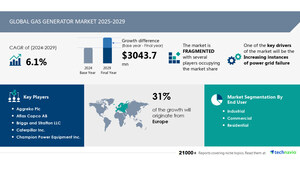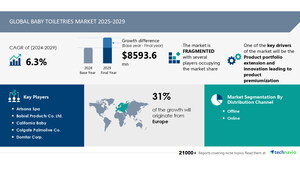NEW YORK, Sept. 18, 2024 /PRNewswire/ -- Report on how AI is redefining market landscape- The global cosmetic serum market size is estimated to grow by USD 1.26 billion from 2024-2028, according to Technavio. The market is estimated to grow at a CAGR of 3.84% during the forecast period. Rising demand for male beauty products is driving market growth, with a trend towards increase in the introduction of organic and natural products. However, availability of counterfeit products poses a challenge. Key market players include Amka Products Pty Ltd., Amway Corp., The Avon Co., Beiersdorf AG, Chanel Ltd., Groupe Clarins, Coty Inc., Edgewell Personal Care Co., Henkel AG and Co. KGaA, Johnson and Johnson Services Inc., Kao Corp., LOreal SA, LVMH Moet Hennessy Louis Vuitton SE, Markwins Beauty Brands Inc., Mary Kay Inc., Shiseido Co. Ltd., The Estee Lauder Companies Inc., The Procter and Gamble Co., Unilever PLC, and ZYMO Cosmetics.
AI-Powered Market Evolution Insights. Our comprehensive market report ready with the latest trends, growth opportunities, and strategic analysis- View your snapshot now
Forecast period |
2024-2028 |
Base Year |
2023 |
Historic Data |
2018 - 2022 |
Segment Covered |
Distribution Channel (Offline and Online), Product (Hair care serum and Skin and sun care serum), and Geography (APAC, Europe, North America, Middle East and Africa, and South America) |
Region Covered |
APAC, Europe, North America, Middle East and Africa, and South America |
Key companies profiled |
Amka Products Pty Ltd., Amway Corp., The Avon Co., Beiersdorf AG, Chanel Ltd., Groupe Clarins, Coty Inc., Edgewell Personal Care Co., Henkel AG and Co. KGaA, Johnson and Johnson Services Inc., Kao Corp., LOreal SA, LVMH Moet Hennessy Louis Vuitton SE, Markwins Beauty Brands Inc., Mary Kay Inc., Shiseido Co. Ltd., The Estee Lauder Companies Inc., The Procter and Gamble Co., Unilever PLC, and ZYMO Cosmetics |
Key Market Trends Fueling Growth
The cosmetic serum market is witnessing a shift towards natural and organic products due to rising health concerns caused by synthetic options. Synthetic cosmetic serums may lead to hair and skin issues, such as irritation and allergies, as well as more serious health problems like nerve damage, chemical burns, and hormonal disorders. In response, manufacturers are increasingly producing organic cosmetic serums using natural ingredients, such as plant extracts, aloe vera, sea salt, charcoal, and various oils like coconut, shea butter, mango seed butter, cocoa seed butter, lanolin, argan oil, jojoba seed oil, apricot kernel oil, beeswax, almond oil, and avocado oil. These ingredients are free from harmful substances like sulfates and formaldehyde, ensuring purity and adherence to regulatory standards. Brands like The Body Shop, a L'Oreal subsidiary, are capitalizing on this trend by offering a wide range of organic and natural cosmetic serums, such as their Grapeseed Hair Serum. This expansion of organic product lines allows vendors to differentiate themselves in the market.
The Cosmetic Serum Market is thriving, with various types of serums gaining popularity among women and some men for self-grooming. Production activities include the manufacturing of anti-aging, skin brightening, acne control, and vitamin-infused serums. Retinol and synthetic ingredients are commonly used in serums. Salons and specialty stores stock specialty serums, while supermarkets/hypermarkets offer a wider range. Trends include the rise of skin care product demand due to beauty consciousness, Western lifestyle, and skin concerns. Supply chain disruptions and counterfeit products pose challenges. The Soil Association certifies cruelty-free and organic serums, appealing to animal welfare-conscious consumers. Anti-pollution serums are in demand due to urban living. YouTube channels provide educational content on skin care products, including serums. The Consumer Goods Industry continues to innovate, with new offerings like anti-aging, acne treatment, and brightening serums. The market faces competition from creams, but serums' targeted delivery system sets them apart. Overall, the Cosmetic Serum Market is a significant player in the skincare sector.
Insights on how AI is driving innovation, efficiency, and market growth- Request Sample!
Market Challenges
- The cosmetic serum market is experiencing significant growth and increased demand, leading to a growth in counterfeit products. These imitation serums, made with low-quality ingredients, pose health risks to consumers. The expansion of e-commerce has facilitated the sale of counterfeit cosmetics, as manufacturers can reach a wider audience. Customers find it challenging to distinguish between genuine and fake serums due to their similar appearances and low pricing. This situation compels original vendors to lower their prices and invest heavily in advertising to retain customers. Counterfeit serums are often produced and transported at lower costs, allowing for cheaper prices. However, these products may contain harmful substances and bacteria, posing health risks. Global players aim to penetrate emerging markets, but the prevalence and affordability of counterfeit serums remain a major challenge.
- The Cosmetic Serum Market in LAMEA region has seen significant growth due to increasing beauty consciousness among consumers. Anti-aging serums, acne control serums, and brightening serums are popular choices. However, challenges persist, such as counterfeit products and animal welfare concerns. Cruelty-free and natural/organic ingredients are preferred. Direct selling and online retail have gained traction. Middle-aged people and men are key segments. Hydrating serums with hyaluronic acid and peptides are in demand. Environmental concerns have led to the rise of anti-pollution serums. Brands like PHILOSOPHY, INC, and Modiface offer customized serums. Beauty salons, department stores, pharmacies/drugstores, and hypermarkets/supermarkets remain key distribution channels. Influencers play a crucial role in marketing. Lockdowns have accelerated the shift towards e-commerce. Premium anti-aging and eye serums continue to drive sales in the Consumer Goods Industry. Face moisturizer serums, face sunscreen serums, and face self-tanning serums are also popular. Households in LAMEA region are adopting these products for their skincare needs.
Insights into how AI is reshaping industries and driving growth- Download a Sample Report
Segment Overview
This cosmetic serum market report extensively covers market segmentation by
- Distribution Channel
- 1.1 Offline
- 1.2 Online
- Product
- 2.1 Hair care serum
- 2.2 Skin and sun care serum
- Geography
- 3.1 APAC
- 3.2 Europe
- 3.3 North America
- 3.4 Middle East and Africa
- 3.5 South America
1.1 Offline- The cosmetic serum market is growing steadily, with an increasing number of consumers seeking effective skincare solutions. Serums offer targeted benefits, absorbing deeper into the skin than regular moisturizers. Brands continue to innovate, introducing new formulations with advanced ingredients for various concerns, such as anti-aging, brightening, and hydration. Consumers prioritize quality and efficacy, driving competition among brands to deliver superior results. The market's future looks bright, with continued growth expected due to the rising demand for personalized and results-driven skincare solutions.
Download complimentary Sample Report to gain insights into AI's impact on market dynamics, emerging trends, and future opportunities- including forecast (2024-2028) and historic data (2018 - 2022)
Research Analysis
The cosmetic serum market encompasses a wide range of skincare products designed to address various concerns, including acne control and treatment, anti-aging, hydration, and protection from pollution. Serums, which are typically lightweight and quickly absorbed, contain active ingredients like hyaluronic acid, peptides, and antioxidants to deliver targeted benefits. Consumers increasingly seek cruelty-free and vegan options, as well as customized serums tailored to their specific skin needs. The market reaches households through various channels, including department stores, pharmacies/drugstores, online retail, and direct selling. However, the rise of counterfeit products poses a challenge, with consumers urged to verify the authenticity of their purchases. Brands utilizing advanced technology, such as Modiface for virtual try-ons, aim to enhance the shopping experience. Face sunscreen serums are gaining popularity as part of a comprehensive skincare routine. Creams and moisturizers continue to be staples, but serums' ability to deliver concentrated, fast-acting benefits sets them apart.
Market Research Overview
The cosmetic serum market encompasses a wide range of skincare products designed to address various skin concerns, including acne control, anti-aging, brightening, and hydration. These lightweight formulations offer targeted benefits, making them increasingly popular among consumers seeking effective solutions for their beauty needs. Serums are available in various product types, such as anti-pollution, eye, face moisturizer, face self-tanning, and face sunscreen serums. The beauty consciousness movement has led to a growth in demand for cruelty-free, natural/organic, and plant-based ingredients. Consumers are also turning to customized and specialty serums for personalized skincare solutions. The market is vast and diverse, catering to different segments like men, middle-aged people, and various skin types. The cosmetic serums market is influenced by various factors, including trends in the LAMEA region, consumer preferences, and the impact of lockdowns on sales channels. Production activities have been affected by supply chain disruptions, leading to increased prices and counterfeit products. Influencers, beauty salons, department stores, pharmacies/drugstores, online retail, and specialty stores are key sales channels for cosmetic serums. Brands like PHILOSOPHY, INC, and Modiface are setting new standards with their innovative offerings, such as hyaluronic acid, peptides, retinol, and vitamin-infused serums. The consumer goods industry, including the cosmetics sector, is undergoing significant changes due to the Western lifestyle and increasing environmental concerns. The Soil Association and other organizations are advocating for sustainable practices and ethical production methods. Overall, the cosmetic serums market is a dynamic and growing industry that continues to evolve in response to consumer demands and trends.
Table of Contents:
1 Executive Summary
2 Market Landscape
3 Market Sizing
4 Historic Market Size
5 Five Forces Analysis
6 Market Segmentation
- Distribution Channel
- Offline
- Online
- Product
- Hair Care Serum
- Skin And Sun Care Serum
- Geography
- APAC
- Europe
- North America
- Middle East And Africa
- South America
7 Customer Landscape
8 Geographic Landscape
9 Drivers, Challenges, and Trends
10 Company Landscape
11 Company Analysis
12 Appendix
About Technavio
Technavio is a leading global technology research and advisory company. Their research and analysis focuses on emerging market trends and provides actionable insights to help businesses identify market opportunities and develop effective strategies to optimize their market positions.
With over 500 specialized analysts, Technavio's report library consists of more than 17,000 reports and counting, covering 800 technologies, spanning across 50 countries. Their client base consists of enterprises of all sizes, including more than 100 Fortune 500 companies. This growing client base relies on Technavio's comprehensive coverage, extensive research, and actionable market insights to identify opportunities in existing and potential markets and assess their competitive positions within changing market scenarios.
Contacts
Technavio Research
Jesse Maida
Media & Marketing Executive
US: +1 844 364 1100
UK: +44 203 893 3200
Email: [email protected]
Website: www.technavio.com/
SOURCE Technavio

WANT YOUR COMPANY'S NEWS FEATURED ON PRNEWSWIRE.COM?
Newsrooms &
Influencers
Digital Media
Outlets
Journalists
Opted In





Share this article